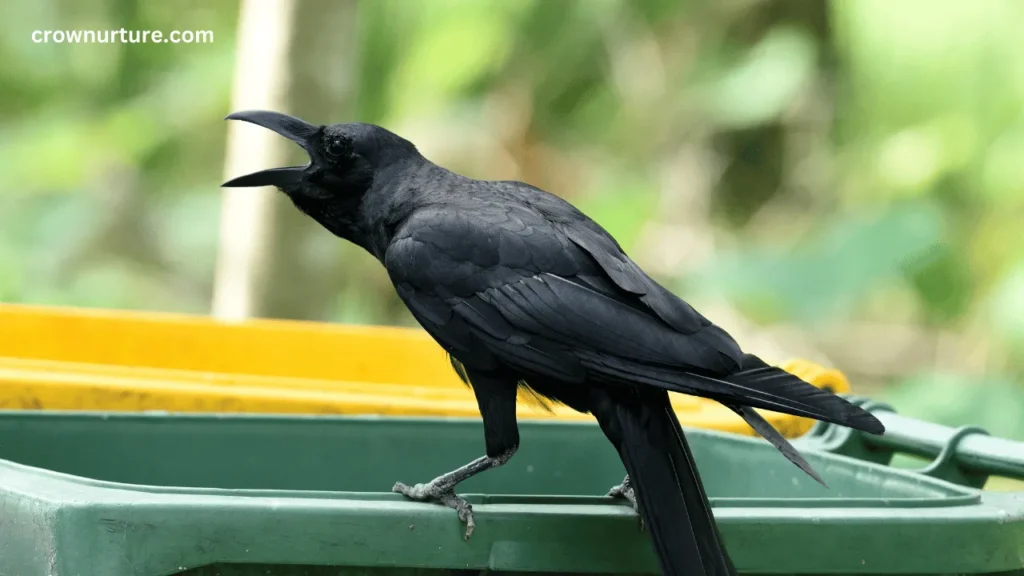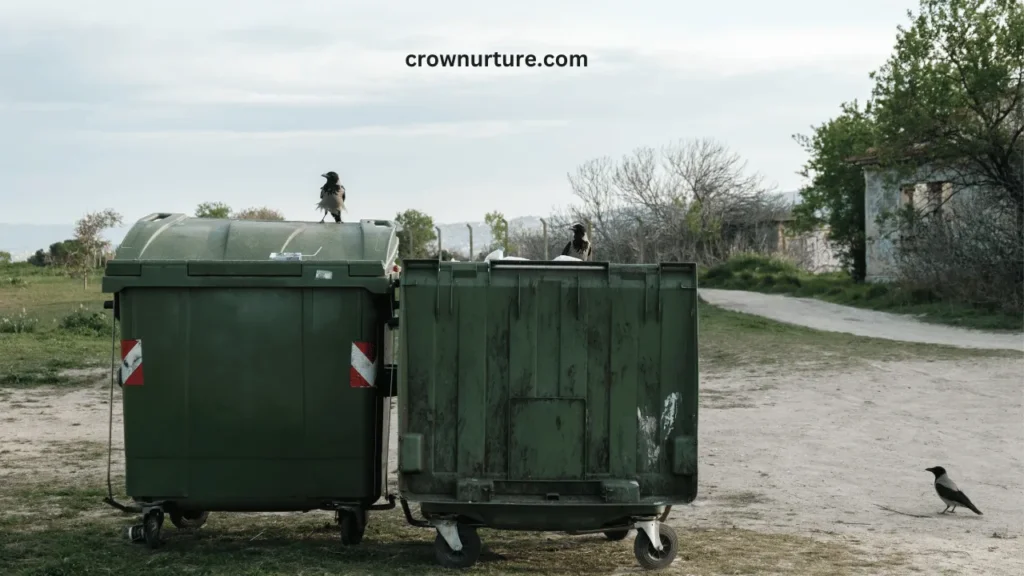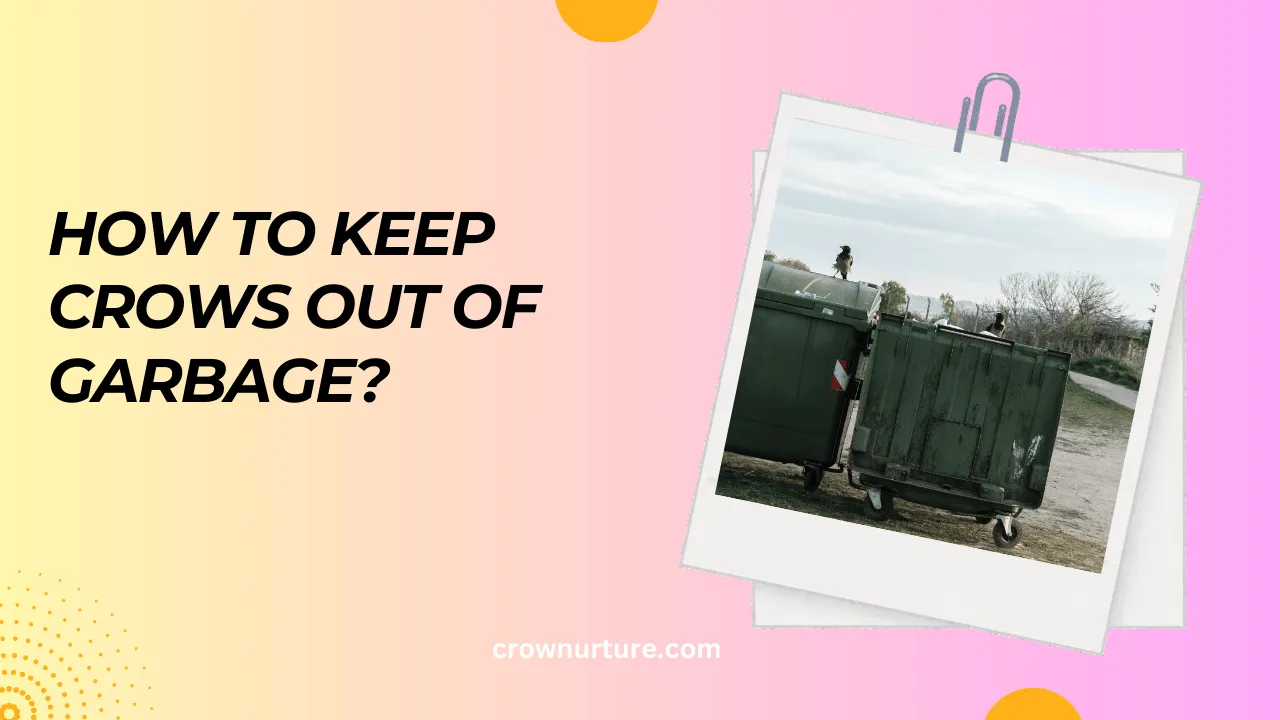Crows are among the smartest birds in the animal kingdom, admired for their problem-solving skills and social behavior. However, their intelligence can turn into a nuisance when they raid your garbage cans, scatter trash everywhere, and create a mess you dread cleaning up.
It’s not just unsightly—it can attract other pests and create sanitation issues. Dealing with crows requires more than simple fixes. These birds are not only clever but also persistent, often working in groups to overcome barriers.
If you’ve ever secured your trash can, only to find it tipped over the next morning, you’re not alone. Understanding their behavior is the first step to keeping your garbage safe from their sharp beaks and cunning minds.
In this guide, we’ll explore proven strategies to keep crows out of your garbage. From securing your bins with smart physical barriers to implementing natural deterrents and working with your community, you’ll learn effective, humane methods to protect your trash—and your peace of mind.

Contents
- 1 1. Understanding Crow Behavior
- 2 2. Physical Deterrents
- 3 3. Chemical Repellents
- 4 4. Environmental Strategies
- 5 5. Legal Considerations
- 6 Conclusion
- 7 FAQs
- 7.1 1. Why are crows attracted to garbage?
- 7.2 2. What is the most effective way to keep crows out of garbage?
- 7.3 3. Do scarecrows really work to deter crows?
- 7.4 4. Can I use motion-activated sprinklers to deter crows?
- 7.5 5. Are homemade repellents safe to use?
- 7.6 6. Will covering my garbage with a net help?
1. Understanding Crow Behavior
Crows are incredibly intelligent and adaptable, capable of solving puzzles and remembering patterns. Their ability to learn makes traditional deterrents less effective over time.
These birds are highly social, often operating in groups to access food. If one crow discovers an easy meal, it won’t be long before others join in, making it even harder to keep them away.
Crows are drawn to food scraps and strong-smelling garbage, particularly meat, bread, and fruit. Identifying and managing these attractants is key to reducing their interest in your trash.
2. Physical Deterrents
Investing in secure garbage cans with tight-fitting lids is one of the most effective ways to deter crows. Adding weights or latches to the lid ensures they cannot pry it open.
Visual deterrents like reflective tape, shiny objects, or scarecrows can scare crows initially. However, it’s important to rotate or reposition these deterrents frequently to keep them effective.
Using physical barriers such as nets or fencing around garbage areas can also prevent crows from accessing your trash. These barriers work best when combined with other methods to reinforce their effectiveness.

3. Chemical Repellents
Commercial repellents designed to deter birds are available, but homemade solutions can be equally effective and environmentally friendly. A simple mix of water, vinegar, and crushed chili peppers can work wonders when sprayed around your garbage area.
Be cautious when using repellents. Avoid harmful chemicals that could endanger other wildlife, pets, or humans. Always test homemade repellents in a small area first to ensure their safety and effectiveness.
Using repellents sparingly and in conjunction with physical barriers increases the likelihood of long-term success.
4. Environmental Strategies
Reduce the appeal of your yard to crows by minimizing available food sources. Clean up fallen fruit, secure compost bins, and avoid leaving pet food outdoors.
Modify your yard to make it less inviting for crows. Remove perching areas like exposed tree branches or install spikes on ledges. Creating a less comfortable environment can encourage them to move elsewhere.
For sustained success, work with your neighbors. Community-wide efforts to secure garbage and deter crows can amplify the impact and prevent them from relocating nearby.
5. Legal Considerations
Before implementing deterrents, check local regulations. Some areas have specific rules regarding wildlife control, and violating them could lead to fines or penalties.
Always use humane methods to deter crows. Harmful practices not only pose ethical concerns but may also be illegal. If unsure, consult a wildlife expert for advice tailored to your situation.
Wildlife professionals can provide insightful recommendations for protecting your garbage while maintaining a respectful relationship with local wildlife.
Conclusion
Keeping crows out of your garbage requires a thoughtful combination of understanding their behavior, using effective deterrents, and making your environment less appealing to them.
While no single method works universally, combining physical barriers, chemical repellents, and environmental adjustments can make a significant difference.
Remember, patience and persistence are crucial. Crows are clever, but with consistent effort, you can outsmart them and maintain a clean, crow-free garbage area.
By working with your community and adhering to humane practices, you can protect your property while coexisting peacefully with these fascinating birds.
FAQs
1. Why are crows attracted to garbage?
Crows are drawn to garbage because it often contains food scraps and strong-smelling items that appeal to their diet.
2. What is the most effective way to keep crows out of garbage?
Secure garbage cans with tight-fitting lids and add latches or weights to prevent crows from opening them.
3. Do scarecrows really work to deter crows?
Scarecrows can be effective temporarily but need to be repositioned regularly to prevent crows from becoming accustomed to them.
4. Can I use motion-activated sprinklers to deter crows?
Yes, motion-activated sprinklers are an effective way to scare crows and other wildlife from your garbage area.
5. Are homemade repellents safe to use?
Most homemade repellents, like vinegar and chili pepper sprays, are safe when used responsibly and sparingly.
6. Will covering my garbage with a net help?
Yes, nets are an effective physical barrier that prevents crows from accessing garbage while still allowing ventilation.








